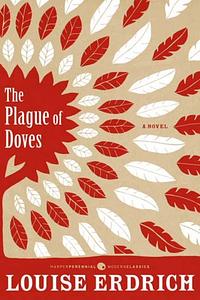Take a photo of a barcode or cover
I would give this book a higher rating had I not come to the end and immediately felt the need to diagram the relationships of the characters. The novel lacks the depth necessary for the intended intricacy of the relationships and I felt as if I couldn't enjoy the beauty of the writing due to the constraints of Erdich's narrative web. To me, it reads like an unfinished masterpiece -- there are many incredible elements, but the narratives often ended abruptly and were often jarring and distracting.
I really enjoyed Plague of Doves. It's quietly ambitious in scope, covering several generations of a town and shifting between 3 (and, at the end, 4) narrators. I had a little difficulty understanding it at first, initially reading it as a series of disjointed stories, centered around Erdrich's familiar, fictional town, Pluto, ND. But, I slowly recognized character names (and surnames across generations), and began to understand how different events and characters related. I think my slow uptake was likely more my fault than Erdrich's, although a character list/key would have nonetheless been helpful (I realize this isn't really a literary criticism).
Relatedly, the central event that seems to tie the novel's different strands together--the murder of Cordelia's/C's family by Warren Wolde (Uncle Wolde), and the subsequent hanging of four of the town's innocent Native Americans--doesn't really read as a central event when it appears. It seems more like the mournful recollection of Mooshun, and--although very interesting--was quickly forgotten by me. Erdrich's interest in changing between characters, and periscoping in and out of the past, gives the book a steady pace and measured feel; but, again, it made me kind of overlook certain parts in the novel, and not give it the full attention it deserved.
Erdrich is a great writer, and this is certainly my favorite book of hers that I've read. So much thought clearly went into the novel but it reads as effortlessly written (which, as discussed above, may unfairly be a reason why it's easy to overlook). Highlights of the book for me include Evelina's brief stay in a psychiatric hospital (first as an aide, then--after a brief relationship with Nonette--as a patient (Erdrich conveys Evelina's depressed and disquieted mental state very well)); the unnerving, near-starved settling of Pluto by Judge Coutts' grandfather (during which his feeling for his landlady change, only to then find that, upon his return to the town, she has married); and the story of the violin.
Relatedly, the central event that seems to tie the novel's different strands together--the murder of Cordelia's/C's family by Warren Wolde (Uncle Wolde), and the subsequent hanging of four of the town's innocent Native Americans--doesn't really read as a central event when it appears. It seems more like the mournful recollection of Mooshun, and--although very interesting--was quickly forgotten by me. Erdrich's interest in changing between characters, and periscoping in and out of the past, gives the book a steady pace and measured feel; but, again, it made me kind of overlook certain parts in the novel, and not give it the full attention it deserved.
Erdrich is a great writer, and this is certainly my favorite book of hers that I've read. So much thought clearly went into the novel but it reads as effortlessly written (which, as discussed above, may unfairly be a reason why it's easy to overlook). Highlights of the book for me include Evelina's brief stay in a psychiatric hospital (first as an aide, then--after a brief relationship with Nonette--as a patient (Erdrich conveys Evelina's depressed and disquieted mental state very well)); the unnerving, near-starved settling of Pluto by Judge Coutts' grandfather (during which his feeling for his landlady change, only to then find that, upon his return to the town, she has married); and the story of the violin.
I can only think to describe this extraordinary novel with a few of Erdrich's own words: "...it began tender and slow, then broke into a wild strangeness that pricked our pulses and strained our breath."
I listened to an audio-download of this, and then had to go back and actually READ a print copy in order to make sense of it all. Erdrich writes beautifully, but often makes her readers plow through a series of apparently unrelated vignettes before the whole thing finally coalesces. As always, there is humor and pathos galore; the history of 20th C native Americans is a painful one at best. This is not my favorite of her books, but Erdrich remains a masterful chronicler of our country's native peoples.
Whoa. It's been a long time since I've read a novel with such a clever twist ending that I really and truly didn't anticipate at all. Louise Erdrich is an incredible Native writer, and The Plague of Doves addresses the very complex, interconnected bloodlines and stories of North Dakota Ojibwe and white (wo)men in such an enlightening way.
This book was the train on the tracks parallel to the one I got onto. So many elements are things I usually enjoy, but I just could never get into the story.
(I also think I should've perhaps paused at the end of each point of view to figure out how the people related to each other, because it took me a WHILE to realize the perspective had even changed) (that one's on me)
(I also think I should've perhaps paused at the end of each point of view to figure out how the people related to each other, because it took me a WHILE to realize the perspective had even changed) (that one's on me)
I don't know where to land. Started slow. Then I loved it. Then it got weird. Then it was amazing again. Too uneven for four stars, but three is misleading because it had a lot to like. If you want a good Erdrich read, pick up The Round House instead.
mysterious
reflective
medium-paced
Plot or Character Driven:
A mix
Strong character development:
Yes
Loveable characters:
Complicated
Diverse cast of characters:
Yes
Flaws of characters a main focus:
No
It took a little effort to keep up with the different narrators/timelines, but it was worth it. Beautiful writing, an interesting story, and a satisfying ending.
A hell of a complex story--or, perhaps, set of interconnected stories--but with patience and the help of a family tree of Erdrich's characters I found on someone's blog I was able to understand most of it. Excellent fiction.
though I've always been an avid fan of Louise Erdrich, this is the best book yet, and I'm 26 pages in. I don't understand the reviewers who were bored. it really couldn't possibly be the book's fault.
---
upon finishing...I was a little let down by the last quarter of the book, which jumped and dragged slightly for my conception of what was happening. the sense of the ending, however, remains chilling.
---
upon finishing...I was a little let down by the last quarter of the book, which jumped and dragged slightly for my conception of what was happening. the sense of the ending, however, remains chilling.






